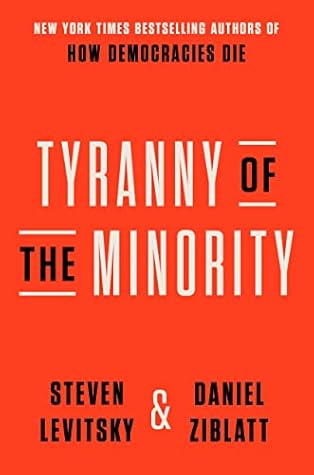More on this book
Community
Kindle Notes & Highlights
Read between
December 29, 2023 - January 4, 2024
Designed in a pre-democratic era, the U.S. Constitution allows partisan minorities to routinely thwart majorities, and sometimes even govern them. Institutions that empower partisan minorities can become instruments of minority rule. And they are especially dangerous when they are in the hands of extremist or antidemocratic partisan minorities.
What ails American democracy today is closer to the opposite problem: Electoral majorities often cannot win power, and when they win, they often cannot govern. The more imminent threat facing us today, then, is minority rule.
How does a democracy get to where Germany is today, where the transfer of power is drama-free? What enables the norm of accepting defeat to take hold? Two conditions help. First, parties are most likely to accept defeat when they believe they stand a reasonable chance of winning again in the future.
A second condition that helps parties accept defeat is the belief that losing power will not bring catastrophe—that a change of government will not threaten the lives, livelihoods, or most cherished principles of the outgoing party and its constituents. Elections often feel like high-stakes battles, but if the stakes are too high, and losing parties fear they will lose everything, they will be reluctant to relinquish power. In other words, it is an outsized fear of losing that turns parties against democracy.
When a political party represents a group that perceives itself to be losing ground, it often radicalizes. With their constituents’ way of life seemingly at stake, party leaders feel pressure to win at any cost. Losing is no longer acceptable.
Fear is often what drives the turn to authoritarianism. Fear of losing political power and, perhaps more important, fear of losing one’s dominant status in society.
Politicians who are committed to democracy, or what the political scientist Juan Linz called loyal democrats, must always do three basic things. First, they must respect the outcome of free and fair elections, win or lose. This means consistently and unhesitatingly accepting defeat. Second, democrats must unambiguously reject violence (or the threat of violence) as a means of achieving political goals.
Second, loyal democrats sever all ties—public and private—with allied groups that engage in antidemocratic behavior.
loyal democrats unambiguously condemn political violence and other antidemocratic behavior, even when it is committed by allies or ideologically proximate groups.
Finally, when necessary, loyal democrats join forces with rival pro-democratic parties to isolate and defeat antidemocratic extremists.


